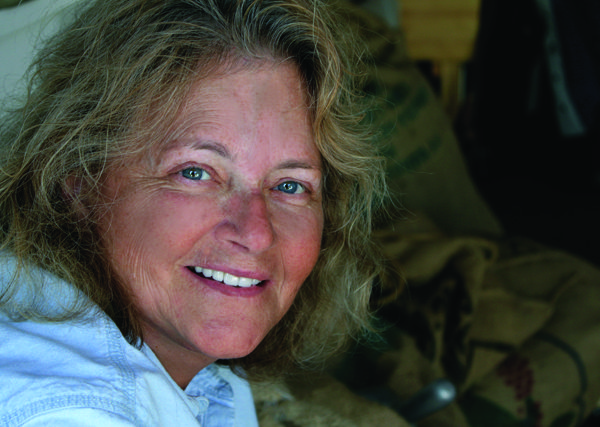Meet the lesbian coffee entrepreneur and altruist behind Arabica Dabra.
If you’re not sure whether a Tanzania Peaberry is a sex toy or the newest mini version of the Blackberry, just ask Jackie Mendelson. “Gorgeous beans!” she proclaims, “I always do a happy dance every time I open up a fresh bag.”
The beans she refers to are coffee beans, and from her exuberance I glean these are something like the Catherine Deneuve of coffee beans. Then again, anything having to do with coffee lights up her face and evokes a delightful outpouring of information that ranges from nuances of taste, to varieties of farming methods and even the history of this now ubiquitous beverage. “I love the Tanzania Peaberry because it is one of the best examples of the fruity notes and flowery aromas of East African coffees, and the double bean expands that profile,” she informs me as I look down at the cup of coffee in my hand. All I know is this is one kick-ass cup of joe.
What many of us consider a daily morning ritual is actually Mendelson’s passion and profession. At an age when many retire, Mendelson has started her own coffee company, Arabica Dabra where she has managed quite successfully to merge her love of coffee with her entrepreneurial spirit and her life long mission of helping others.
Mendelson spent 30 years working in the non-profit sector, and the root of her coffee business actually emerged from the 15 years she spent fighting the HIV/AIDS pandemic. “I had the privilege of opening clinics around the world, so I went to Uganda, Kenya, Swaziland, Cambodia, India and Latin America. Wherever I went that was close to the equator, I saw that they were growing coffee,” says the former chief of operations for the AIDS Healthcare Foundation. Many of the people she helped were coffee growers, so she had the opportunity to learn first hand. “I went onto the farms and started talking to the farmers about how they nurtured their saplings, grew trees, pruned and picked.”
She also noticed that the sale of coffee beans was often the only means of financially supporting these farmers and if these communities were to survive and flourish where AIDS and poverty had devastated the populations, nurturing this trade was imperative. Mendelson realized “that it was vital that they sold their coffee and got the best price they could.” Which is why she now buys beans from these areas, and in addition gives back a portion of the proceeds to help these communities. She does this by buying and donating pigs, goats, cows and bicycles to farmers—tools that are integral to growing and sustaining their livelihoods.
“You don’t have to be a big corporation or nonprofit to make a difference,” Jackie says “You can be someone that is a small independent business owner that decides, I can do something on my own to put something back in the pot.”
Her business model of giving back with Arabica Dabra also extends to the consumer. “I wanted to bring coffee that I knew was excellent to people who were used to getting just Starbucks or Colombian—just the generic basic cup of coffee,” she explains.
With the enthusiasm of the well-caffeinated she shares stories of her work around the world fighting HIV/AIDS. Her deep connection to the lands and their people comes from working in the trenches. Many of those who survived because of treatment joined her in helping others. “From the jungles in Cambodia to India, the Ukraine and China…people working together to get others medication are the most wonderful and kindest and inspirational people on earth. They are all champions.”
As to the origin of Mendelson’s unbelievably fearless commitment to the helping people in other countries (which at one point to lead her to slash her way through the jungle thickets in search of a site for a clinic) Mendelson offers a simple explanation: “I was a hippy in the Haight-Ashbury in the 1960s!”
Jackie Mendelson has a head for coffee and a heart for giving. “If you buy coffee through me,” she tells me, “You don’t get a tax write off, but you get a pound of unbelievably good coffee. It’s certainly fresher than any coffee you buy at the grocery store and at the same price.” Not to mention that with every sip you take, you’re making a difference. (tastymagic.com)
